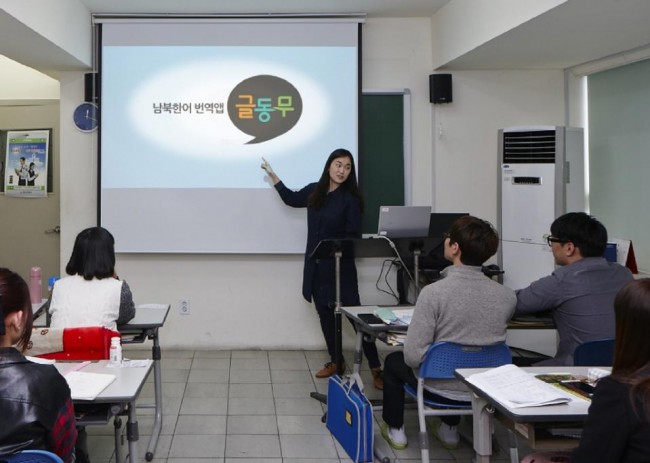Pictured above: An instructor demonstrates how to use a dictionary app to a group of teen North Korean defectors. (Photo via Cheil Worldwide)
by REERA YOO | @reeraboo
editor@charactermedia.com
A new smartphone app has been developed in South Korea to help North Korean defectors overcome one of the biggest barriers in assimilating to life in South Korea—speaking in the Seoul dialect.
To South Koreans, English words like “ice cream” and “shampoo” are part of everyday language, thanks to America’s cultural influence through its military and pop culture presence. However, to North Korean defectors who fled their reclusive country, these words have no meaning.
Seven decades of separation have created a linguistic gap so wide that some language experts believe that about a third of everyday words used in the two Koreas are different. Even the simplest tasks such as asking for directions require a new vocabulary for defectors living in South Korea.
With this in mind, Seoul advertising firm Cheil Worldwide teamed up with local nonprofits to develop Univoca, a South Korean-North Korean dictionary app, to help socially marginalized defectors overcome communication issues.
 Photo via thenextgag.com
Photo via thenextgag.com
According to Agence France-Presse, the app offers translations of 3,600 key words plucked from South Korean high school textbooks and modern-day slang, making it an incredibly useful for teen defectors struggling in school. Users can scan unfamiliar words with their smartphone camera or manually input text for translation. Since its launch in mid-March, the app has been downloaded more than 1,500 times.
“For North Korean teen defectors, who are more sensitive to cultural differences, the language issue is considered a first priority to solve when settling down in South Korea,” Cheil said in a statement.
According to the Ministry of Education, the population of North Korean student defectors, excluding those of college age, rose from 966 students in 2008 to 2,183 last year.
Many of these students face challenges of learning rapidly-changing youth slang and “konglish” vocabulary, which uses English words in non-standard ways, like “service” for freebies, “dika” for digital camera and “hand phone” for cellphone.
Noelle Kim, one of the defectors who helped provide translations for the app, said working on the project brought back memories of her own linguistic struggle. She recalled having difficulty mastering English words and how reading just a few pages of a South Korean school textbook used to take her hours.
“Something like this app would have been a precious gift to new arrivals like myself five years ago,” Kim said.
___
Recommended Reading:
“North and South Korea Face Increasing Linguistic Gap” by the Associated Press







